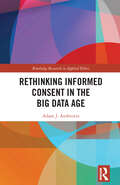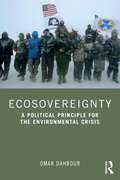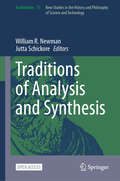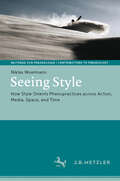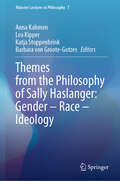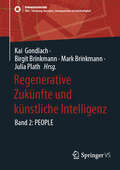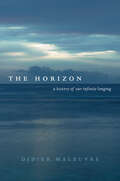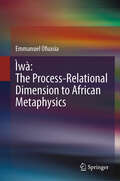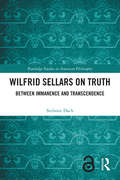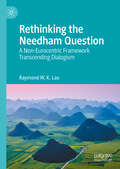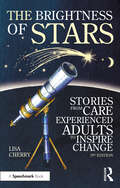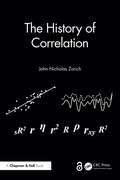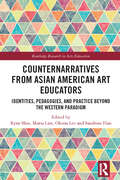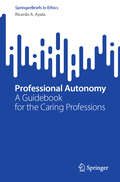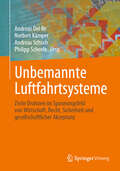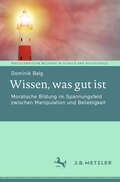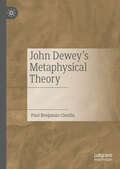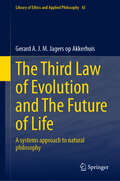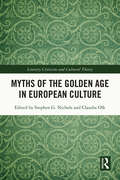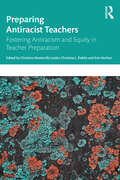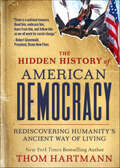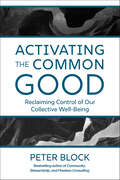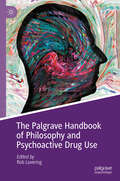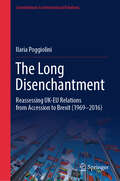- Table View
- List View
Rethinking Informed Consent in the Big Data Age (Routledge Research in Applied Ethics)
by Adam J. AndreottaIn the “big data age”, providing informed consent online has never been more challenging. Countless companies collect and share our personal data through devices, apps, and websites, fuelling a growing data economy and the emergence of surveillance capitalism. Few of us have the time to read the associated privacy policies and terms and conditions, and thus are often unaware of how our personal data are being used. This is a problem, as in the last few years, large tech companies have abused our personal data. As privacy self-management, through the mechanism of providing online consent, has become increasingly difficult, some have argued that surveillance capitalism and the data economy more broadly need to be overthrown.This book presents a different perspective. It departs from the concept of revolutionary change to focus on pragmatic, incremental solutions tailored to everyday contexts. It scrutinises how consent is currently sought and provided online and offers suggestions about how online consent practices can be improved upon. These include the possibility of subjecting consent-gathering practices to ethics committees for review; the creation of visual-based consent agreements and privacy policies to help with transparency and engagement; the development of software to protect privacy; and the idea of automated consent functionalities that allow users to bypass the task of reading vast amounts of online consent agreements. The author suggests that these “small-scale” changes to online consent-obtaining procedures could, if successfully implemented, provide us with a way of self-managing our privacy in a way that avoids a revolutionary dismantling of the data economy. In the process, readers are encouraged to rethink the very purpose of providing informed consent online.Rethinking Informed Consent in the Big Data Age will appeal to researchers in normative ethics, applied ethics, philosophy of law, and the philosophy of AI. It will also be of interest to business scholars, communication researchers, students, and those in industry.
Ecosovereignty: A Political Principle for the Environmental Crisis
by Omar DahbourIn this book, Omar Dahbour develops the idea of ecosystem sovereignty, calling for a reinterpretation of some essential concepts in political philosophy, including territoriality, self-determination, peoplehood, and sovereignty, in order to make the case for peoples’ rights to protect and maintain their natural environments. In doing so, he theorizes current and historical struggles against resource extractions and land grabs, especially by food sovereignty and indigenous rights movements.The basic idea of ecosovereignty is that peoples living in relation to particular ecosystems have a collective right to ultimate authority over those systems and the resources they contain—provided they manage them sustainably. Dahbour argues that this authority has a legitimacy that overrides that of larger states, at least with regard to matters of environmental management. Ecosovereignty claims may strengthen challenges by peoples to states and corporations seeking to control and transform lands and waters for development, against the wishes of their inhabitants. Dahbour hopes the idea will provide a powerful tool for halting extractivism and ecocide, along with the extreme violence that these processes use against farming, indigenous peoples, and nature.Connecting political and environmental philosophy in an innovative way, Ecosovereignty: A Political Principle for the Environmental Crisis will keep scholars and students informed about an increasingly important topic.
Traditions of Analysis and Synthesis (Archimedes #73)
by Jutta Schickore William R. NewmanThis open access book provides a fresh perspective on analysis and synthesis across several areas of inquiry. The two operations form a primary basis of modern laboratory science, ranging from the spectrographic analysis used in practically every scientific discipline today, to the naming of entire disciplines, such as synthetic organic chemistry. Despite their acknowledged significance, however, the history of analysis, synthesis, and their relations over the longue durée is poorly understood. Several volumes have been devoted to the history of analysis and synthesis in the sense that premodern mathematicians and philosophers used the terms, but very little work has been done on the tradition of material decomposition and recomposition and its relationship to mathematics and philosophy. The present volume brings together scholars in the history of medicine, mathematics, philosophy, chemistry, and alchemy to explore the ways in which these multiple disciplines understood and used analysis and synthesis as experimental, justificatory, and conceptual tools.
Seeing Style: How Style Orients Phenopractices across Action, Media, Space, and Time (Beiträge zur Praxeologie / Contributions to Praxeology)
by Niklas WoermannHow do social practices prefigure experiences, and how does embodied experience organize the performance of practices? This book suggests that the classic concept of style offers a fresh answer to the question how doings and sayings are linked into practice bundles. Based on a rich ethnographic study of the visual practices of the German-speaking freeskiing subculture, this work develops a theory of phenopractices, or embodied cultural practices dedicated to apprehending and expressing style. Focusing on the visual dimension, it extends the thought of Garfinkel and Schatzki using recent insights from science and technology studies and research at the intersection of neuroscience and phenomenology. This offers a new perspective on fundamental practice-theoretical questions about the nature of practice elements, social order in the context of rules and regularity, or action and practical intelligibility. Each chapter discusses and develops foundational concepts such as time, space, action, emotion, or perception based on an analysis of freeskiing practices such as planning a route in the backcountry, testing a new ski model, or judging freestyle contests. The central argument is that cultural styles of conduct are not only symbolic structures, but a functional resource which organizes situational intelligibility and thus enables social order based on aligned and managed embodied routines. Because the stabilization, dissemination, and evolution of such styles happens via different media, practice change is primarily influenced by media rather than symbolic, rational, or functional needs or ends. A rich ethnography and provocative theoretical argument of interest to anyone working on contemporary practice thought, advancing phenomenology, the sociology of vision, lifestyle sports, media, or practice evolution.
Themes from the Philosophy of Sally Haslanger: Gender – Race – Ideology (Münster Lectures in Philosophy #7)
by Anna Kahmen Barbara von Groote-Gotzes Lea Kipper Katja StoppenbrinkThis book offers a critical discussion of Sally Haslanger's philosophical oeuvre. Published on the occasion of the annual Münster Lectures in Philosophy held by Prof. Haslanger in the winter of 2019, it covers both her prominent work on the themes of gender, race, and ideology, as well as her research on social practices and social structures. Conceptual, methodological, practical as well as normative approaches are pursued to more closely understand Sally Haslanger’s claims, arguments, and discursive goals. The direct correspondence between Sally Haslanger and her interlocutors makes this a very unique book suitable for both advanced scholars as well as graduate students.
Regenerative Zukünfte und künstliche Intelligenz: Band 2: PEOPLE (SDG - Forschung, Konzepte, Lösungsansätze zur Nachhaltigkeit)
by Kai Gondlach Birgit Brinkmann Mark Brinkmann Julia PlathDer Band basiert auf den 17 Entwicklungszielen (SDGs) der UNO und entwickelt für die Wirtschaft Zukunftsperspektiven zum Zusammenhang von KI und Nachhaltigkeit.
The Horizon: A History of Our Infinite Longing
by Didier MaleuvreWhat is a horizon? A line where land meets sky? The end of the world or the beginning of perception? In this brilliant, engaging, and stimulating history, Didier Maleuvre journeys to the outer reaches of human experience and explores philosophy, religion, and art to understand our struggle and fascination with limits—of life, knowledge, existence, and death. Maleuvre sweeps us through a vast cultural landscape, enabling us to experience each stopping place as the cusp of a limitless journey, whether he is discussing the works of Picasso, Gothic architecture, Beethoven, or General Relativity. If, as Aristotle said, philosophy begins in wonder, then this remarkable book shows us how wonder—the urge to know beyond the conceivable—is itself the engine of culture.
Ìwà: The Process-Relational Dimension to African Metaphysics
by Emmanuel OfuasiaThis book approaches the subject of African metaphysics historically as it connects Ancient Egypt to Yorùbá. It provides a history of African metaphysics from ancient Egypt or Kemet down to John Boakye Danquah and Placide Tempels in the 20th century and then Innocent Asouzu, Ada Agada, and Aribiah David Attoe, in the 21st century. As it surpasses the deductions of these previous works, it moves further to showcase African originality and approaches to studying reality, whilst resisting the temptation to deduce conclusions from Western philosophy. It is the first book in the history of African philosophy to use a process-relational approach to interrogate African metaphysics. It also serves to harmonize and engage prominent African scholars who have written on the subject of African metaphysics. The general scope of this book centers on engaging the history of distortion and misunderstanding of African metaphysics by providing a relevant and reliable process-relational background as well as an alternative trivalent logic system. Unless African metaphysical theories are understood from this perspective, they will remain powerless to overcome these misrepresentations. It appeals to students and researchers internationally actively working in the fields of African philosophy, Intercultural African studies as well as process studies. ______________________________ “This book is one of the valuable contributions to the emerging field of African philosophy, after decades (1970s–1990s) of rather fruitless debates on the status of the discipline. Like many others, the book side-tracks the seemingly unending controversy of whether or not there is such a thing as African philosophy.” – Godwin Sogolo, Emerittus Professor of Philosophy, National Open University of Nigeria (NOUN). “In the opening lines of the introduction of this monumental book, Dr. Ofuasia announces: “As you read these lines, the earth in which you live in, as an ontological entity is spinning at an estimate estimated speed of 67, 000 mph. This indicates that the perspective that a thing is not in motion or is at rest is one of the fallacies ever fed to humanity. Nothing rests!” I was awe struck by how this revelation from physics extends to metaphysics. This book is a welcoming addition to African metaphysical scholarship as the process-relational approach used to explore Egyptian and ancient Yorùbá thought system in this work creatively intersects emerging discourses on agency both at the animate and what humans call inanimate, ontology, plant sentience, African medicine, cosmogony, the physical sciences, neutral nihilism and other related metaphysical topics. The eclectic interrogation of classical concepts of Ìwà and Nun from the Yoruba and Egyptian intellectual traditions, respectively, is a trail-blazing contribution. Congratulations on this feat, Dr Ofuasia!” – Ademola Kazeem Fayemi, Queensland Bioethics Center, Australian Catholic University, Brisbane. “Dr Ofuasia’s book marries aspects of Egyptian philosophy with ancient Yorùbá metaphysics and process metaphysics, all under the framework of Ezumezu logic, and it works. What has emerged from this marriage is a new and contemporary theory in African metaphysics – Ìwà ontology which is strongly grounded on African thought. This book is recommended for anyone interested in (African) metaphysics.” Aribiah David Attoe, University of the Witwatersrand. “Emmanuel Ofuasia’s text is engaged, at times even - rightfully - angry. This makes this a lively, energetic contribution. I appreciate that. This passion is often missing in philosophy, but it is much needed, especially in this area of research.” – Bjoerne Freter, Hagerstown Community College, Maryland. “In this timely work, Emmanuel Ofuasia throws down a challenge to African philosophers with the claim that process th
Wilfrid Sellars on Truth: Between Immanence and Transcendence (Routledge Studies in American Philosophy)
by Stefanie DachThis book offers an innovative defense of Wilfrid Sellars’s notion of ideal truth.Sellars adopts two attractive ideas about truth: the pragmatist idea that the concept of truth cannot be understood independently from the norms and practices we find ourselves with and the realist idea that there is one ultimate truth about how the world is. Sellars is thus committed both to an immanent notion of truth and an ideal notion of truth. This book discusses these countervailing tendencies and tries to reconcile them. The author’s defense of Sellars’s notion of truth minimizes problematic commitments while still being recognizably rooted in Sellars’s texts. Additionally, the author defends several innovative claims with respect to Sellars’s thinking, for example, about the relative unimportance of his controversial concept of pictorial adequacy and about the neglected significance of considerations concerning context-sensitive expressions in his thought.Wilfrid Sellars on Truth will be of interest to scholars and advanced students working on Wilfrid Sellars, pragmatism, and questions about truth, naturalism, and scientific realism.Chapters 3, 4, and 6 of this book are freely available as downloadable Open Access PDFs at http://www.taylorfrancis.com under a Creative Commons Attribution-Non Commercial-No Derivatives (CC-BY-NC-ND) 4.0 license.This work was supported by the University of West Bohemia.
The Embarrassment of Being Human: A Critical Essay on the New Materialisms and Modernity in an Age of Crisis
by Benjamin BoysenWith the message that everything in a sense is alive, thus allowing us to join forces with new politico-ethical communities stretching across human and nonhuman realms, the new materialisms have captivated the minds of many academics, artists, and intellectuals by stressing that it is time to return to a premodern mindset and discard modernity and its concepts of secularization, autonomy, and finitude.The Embarrassment of Being Human not only demonstrates how these magical materialisms are beset by grave theoretical and practical inconsistencies and self-contradictions. It also demonstrates how their demand for humans to step down and allow for an emancipation of things qualifies the new materialisms as a metaphysics of neoliberalism that reproduces and fortifies the self-contradictions rampant in the current neoliberal hegemony.While helping us to gain a comprehensive understanding of the tenets of the eerie ills of our epoch, the critique of the new materialisms can furthermore inspire us to appreciate how the exact inversion of the new materialist complex amounts to a revitalization of the modern project. A revitalization that is critical to think our epoch differently.
Rethinking the Needham Question: A Non-Eurocentric Framework Transcending Dialogism
by Raymond W. LauThis book offers a new investigation of the Needham Question. Why did modern science emerge in Europe, but not in any of the advanced non-European civilizations? Eurocentric accounts attribute it to certain ‘qualities’ said to be ‘unique’ to Europe. Opposed to the Eurocentric view is a position known as the ‘dialogical perspective’. Dialogism argues that Europe borrowed heavily from non-European scientific knowledges, and that scientific exchanges were key to the development of modern science. Neo-Eurocentric arguments have emerged in response to the challenge of dialogism, and the debate between Eurocentrism/neo-Eurocentrism and dialogism currently stands at a stalemate. In this book, Raymond Lau brings a new theoretical-methodological framework to finally settle this debate. The historical analysis developed here shows that to secure the non-Eurocentric case, and decisively rebut Eurocentrism and neo-Eurocentrism, it is necessary to go beyond dialogism both theoretically and methodologically.
The Brightness of Stars: Stories from Care Experienced Adults to Inspire Change
by Lisa CherryIn this poignant book, Lisa Cherry brings together a collection of candid and personal reflections on the care system in the UK, offering alternative ways of thinking about the care experience, supporting better ways of working, and providing justification for a trauma-informed lens to be applied to all forms of work with those in care.Through personal insights and reflections, the book brings often-unheard stories vividly to life, beginning with the author’s own. These are stories about love and pain; hurt and isolation; the depth of lived experience that makes up a life; how we live our lives through our relationships with others and where we feel we fit in. In this thoughtfully compiled third edition, original contributors look back on their own reflections from the lives that they live now, new stories bring new perspectives, and discussion points provide the opportunity to consider the realities of the care experience as well as life beyond.Whilst each story is unique, shared themes reveal the truth of the care system and, coming at a time where there is a real opportunity for change, the narratives in this book are ultimately stories of hope and connection. This is crucial reading for policy makers, those working in social work, education and adoption, as well as care experienced adults.
The History of Correlation
by John Nicholas ZorichAfter 30 years of research, the author of The History of Correlation organized his notes into a manuscript draft during the lockdown months of the COVID-19 pandemic. Getting it into shape for publication took another few years. It was a labor of love.Readers will enjoy learning in detail how correlation evolved from a completely non-mathematical concept to one today that is virtually always viewed mathematically. This book reports in detail on 19th- and 20th-century English-language publications; it discusses the good and bad of many dozens of 20th-century articles and statistics textbooks in regard to their presentation and explanation of correlation. The final chapter discusses 21st-century trends.Some topics included here have never been discussed in depth by any historian. For example: Was Francis Galton lying in the first sentence of his first paper about correlation? Why did he choose the word "co-relation" rather than "correlation" for his new coefficient? How accurate is the account of the history of correlation found in H. Walker's 1929 classic, Studies in the History of Statistical Method? Have 20th-century textbooks misled students as to how to use the correlation coefficient?Key features of this book: Charts, tables, and quotations (or summaries of them) are provided from about 450 publications. In-depth analyses of those charts, tables, and quotations are included. Correlation-related claims by a few noted historians are shown to be in error. Many funny findings from 30 years of research are highlighted. This book is an enjoyable read that is both serious and (occasionally) humorous. Not only is it aimed at historians of mathematics, but also professors and students of statistics and anyone who has enjoyed books such as Beckmann's A History of Pi or Stigler's The History of Statistics.
Counternarratives from Asian American Art Educators: Identities, Pedagogies, and Practice beyond the Western Paradigm (Routledge Research in Arts Education)
by Ryan Shin Maria Lim Oksun Lee Sandrine HanCounternarratives from Asian American Art Educators: Identities, Pedagogies, and Practice beyond the Western Paradigm collects and explores the professional and pedagogical narratives of Asian art educators and researchers in North America. Few studies published since the substantial immigration of Asian art educators to the United States in the 1990s have addressed their professional identities in higher education, K-12, and museum contexts. By foregrounding narratives from Asian American arts educators within these settings, this edited volume enacts a critical shift from Western, Eurocentric perspectives to the unique contributions of Asian American practitioners.Enhanced by the application of the AsianCrit framework and theories of intersectionality, positionality, decolonization, and allyship, these original contributor counternarratives focus on professional and pedagogical discourses and practices that support Asian American identity development and practice. A significant contribution to the field of art education, this book highlights the voices and experiences of Asian art educators and serves as an ideal scholarly resource for exploring their identity formation, construction, and development of a historically underrepresented minoritized group in North America.
Professional Autonomy: A Guidebook for the Caring Professions (SpringerBriefs in Ethics)
by Ricardo A. AyalaAimed at supporting their emancipatory project, this book explores strategies for resisting dominance and enhancing agency within the caring professions. It helps bridge the gap between theoretical and practical autonomy in these fields, which have long been overshadowed by other professional groups. The book scrutinises the often-misunderstood notion of autonomy, which is frequently equated with mere independence—an equation that can paradoxically undermine, rather than improve, care quality. Additionally, it critiques the prevailing lack of a specific philosophical framework for practice. Existing literature typically approaches professional autonomy through a liberal philosophy lens or loosely assigns moral agency to groups, leading to a view of autonomous professions as analogous to autonomous individuals. By presenting a critical overview of the main schools of thought on autonomy—emphasising group autonomy and the specific challenges faced by caring professions—this book aims to fill a significant gap. It includes case studies to ground its theoretical insights in practical examples from real-world scenarios, helping the caring professions identify both autonomy issues and opportunities for enhancing autonomous practice.
Unbemannte Luftfahrtsysteme: Zivile Drohnen im Spannungsfeld von Wirtschaft, Recht, Sicherheit und gesellschaftlicher Akzeptanz
by Andreas Del Re Norbert Kämper Andreas Schoch Philipp ScheeleDrohnen sind längst von einer vielversprechenden Zukunftstechnologie zu einer etablierten Größe am Himmel geworden. Durch die zunehmenden Möglichkeiten ziviler Nutzung nimmt ihre Präsenz dabei immer noch zu, wodurch Fragen aufgeworfen werden, die schon heute beantwortet werden müssen. Neben den obligatorischen rechtlichen Fragen geht es dabei auch um den gesellschaftlichen Einfluss, den neue Technologie seit je her mit sich bringen. Welche rechtlichen Rahmenbedingungen sind nötig, wenn immer mehr Drohnen sich den Luftraum mit anderen Luftverkehrsteilnehmern teilen? Wie ist es um die Sicherheit, auch IT-Sicherheit bestellt, wenn zunehmend Drohnen über der Bevölkerung schweben? Welche ethischen Herausforderungen bringen unbemannte Systeme mit sich, die zunehmend autonom operieren? All jenen Fragen widmen sich die Autoren dieses Sammelbandes und schaffen so neue Zugänge und Perspektiven auf das Zukunftsthema der Unbemannten Luftfahrtsysteme.
Wissen, was gut ist: Moralische Bildung im Spannungsfeld zwischen Manipulation und Beliebigkeit (Philosophische Bildung in Schule und Hochschule)
by Dominik BalgWas sind die Ziele moralischer Bildung? Angesichts aktueller moralischer Herausforderungen, so ein naheliegender Gedanke, müssen wir zukünftigen Generationen gezielt vermitteln, dass einige Rede- und Verhaltensweisen schlichtweg moralisch problematisch sind, und dass es spezifische moralische Prinzipien gibt, die es zu berücksichtigen gilt. Gleichzeitig provoziert eine solche Überlegung unmittelbar die Sorge, dass es sich bei der Vermittlung spezifischer moralischer Ansichten um eine Form illegitimer Bevormundung handeln würde – sollte es bei moralischer Bildung nicht vielmehr um die Befähigung zur eigenständigen Reflexion moralischer Problemzusammenhänge gehen? Vor dem Hintergrund dieser Spannung zwischen dem Wunsch, klar für konkrete Werte einzustehen und der Sorge, Heranwachsende in ihrem Recht auf eine individuelle Urteilsbildung einzuschränken, möchte ich die Idee diskutieren, dass es bei moralischer Bildung um die gezielte Vermittlung moralischen Wissens gehen sollte – also Wissen darüber, was moralisch richtig und was moralisch falsch ist. Obwohl es sich hierbei um eine durchaus kontroverse Idee handelt, verdient Sie vor dem Hintergrund aktueller moralischer Herausforderungen meiner Meinung nach dringend einer genaueren Betrachtung.
John Dewey's Metaphysical Theory
by Paul Benjamin CherlinJohn Dewey’s Metaphysical Theory provides an overview and technical exposition of Dewey’s mature ontological theory. In particular, “nature,” “experience,” and their relationship, are given extended treatment through a close reading of primary texts. Following Dewey’s metaphysical postulates and conclusions, the book suggests how experience may reveal the fundamental traits of nature. In addition, the book reveals how Dewey understood the ways in which all phenomena may relate within an inclusive economy of existence, what it means to have an “identity,” what constitutes “selfhood” or personality, and how metaphysics relates to the ideals of democracy and social ethics.
The Third Law of Evolution and The Future of Life: A systems approach to natural philosophy (Library of Ethics and Applied Philosophy #43)
by Gerard A. Jagers op AkkerhuisThis book offers a step-by-step introduction to an integrated theory of physical and biological evolution, from the early universe to the world we know today. To this end, the well-known laws of variation and selection are supplemented by a third law. This law describes the increase in complexity based on the transitions from quarks to hadrons, to atoms, to molecules, to bacteria, to eukaryotic cells, and so on. These insights revolutionize existing theoretical frameworks for analyzing organization in nature, accelerating developments in natural philosophy. In this way, the author develops a basic framework for thinking about evolution, which can be applied to current debates in various research fields. For example, the new approach finally helps to find the systems-based definitions of organism and life that have been sought for so long. By extrapolating the framework one can even hypothesize about future evolution and our place as humans in it. An exciting read for both philosophers and scientists.
Myths of the Golden Age in European Culture (Literary Criticism and Cultural Theory)
by Claudia Olk Stephen G. NicholsHesiod’s concept of a Golden Age, together with analogous myths – Babylonian, Egyptian, Hebrew, etc. – speak to the psychic appeal, perhaps even deep-rooted need, for humans to conceive alternate worlds free from the anguish, toil, and dangers of the one they inhabit. Classical poets and philosophers explored the myth; the Middle Ages imagined it as the land of Cockaigne; Early Modern dramatists incorporated it; Romantic poets and nineteenth-century writers imagined it in various guises. This volume explores the configuration presented by Hesiod and the history of its reception and transformation in European literature and culture. The chapters study how texts written in specific historical moments of European history reshape elements of the myth to explore contemporary issues of concern. The book addresses these issues of cultural hybridization, and, from a transhistorical perspective, provides new insights into the dynamics of epochal shifts. It also looks at similar configurations in non-Western civilizations (China), which complements the spectrum of contributions that covers periods from classical antiquity to the Age of Goethe.
Preparing Antiracist Teachers: Fostering Antiracism and Equity in Teacher Preparation
by Christina L. Dobbs Christine Montecillo Leider Erin NerlinoPreparing Antiracist Teachers: Fostering Antiracism and Equity in Teacher Preparation examines multiple strategies and theories for developing antiracist attitudes and actions in teachers and teacher candidates. This textbook uses critical consciousness as a framework to help practitioners and scholars to facilitate the process of doing antiracist work.The book is divided into three sections, with Part 1 focusing on critical reflection, which refers to a social analysis and moral rejection of societal inequities, such as social, economic, racial/ethnic, and gender inequities, that constrain well-being and human agency. It shows that those who are critically reflective view social problems and inequalities in systemic terms and are therefore better able to address them. Part 2 examines sociopolitical efficacy, which refers to the perceived capacity to effect social and political change by individual and/or collective activism. Part 3 centers on critical action, that is, individual or collective action taken to change aspects of society, such as institutional policies and practices, that are perceived to be unjust. This is a broad view of activism that can include participation in activities such as voting, community organizing, and peaceful protests.Showcasing both USA-based and international case studies, Preparing Antiracist Teachers will support teacher educators in their work by presenting nuanced and important means of teacher education for antiracism and critical consciousness. It will also benefit those studying related courses, including Teacher Education, Social Justice Education, and Multicultural Education.
Hidden History of American Democracy: Rediscovering Humanity's Ancient Way of Living
by Thom HartmannAmerica's most popular progressive radio host and New York Times bestselling author Thom Hartmann paves the way to saving our democracy. In this powerful, sweeping history and analysis of American democracy, Thom Hartmann shows how democracy is the one form of governance most likely to produce peace and happiness among people. With the violent exception of the Civil War, American democracy resisted the pressure to disintegrate into factionalism for nearly two centuries, and now our very system of democratic elections is at stake. So how do we save our democracy? Hartmann's newest book in the celebrated Hidden History Series offers a clear call to action and a set of solutions with road maps for individuals and communities to follow to create a safer, more just society and a more equitable and prosperous economy.
Activating the Common Good: Reclaiming Control of Our Collective Well-Being
by Peter BlockA powerful, inspiring, and achievable vision of a society based on cooperation and community instead of competition and commodification. This book counters the dominant and destructive story that we are polarized, violent, selfish, and destined to consume everything in sight. That is not who we are. The challenge, Peter Block says, is that we are suffering under an economic theology that is based on scarcity, self-interest, competition, and infinite growth. We're told we can purchase and outsource all that matters. Block calls this the business perspective narrative. It dominates not only the economy but also architecture, faith communities, journalism, arts, neighborhoods, and much more. Block offers an antidote: the common good narrative. It embodies the belief that we are basically communal and cooperative. And that we have the capacity to communally produce what we care most about: raising a child, safety, livelihood, health, and a clean and sustainable environment. This book describes how shifts to the common good perspective could transform many areas, fostering journalism that reports on what works, architecture that designs habitable spaces creating connection, faith collectives that build community, a market that is restrained and local, and leadership and activism that build social capital by creating trust among citizens. With these shifts, we would fundamentally change the world we live in for the better.
The Palgrave Handbook of Philosophy and Psychoactive Drug Use
by Rob LoveringIn this Handbook, philosophers from around the world address the metaphysics, epistemology, and value of psychoactive (mind-altering) drug use. In so doing, they attempt to answer questions such as: What does the fact of drug-induced mind-altering experiences tell us about natures of the mind, free will, and God? What does it tell us about what, and how, we can know? Are drug-induced mind-altering experiences valuable, morally, aesthetically, or otherwise? Is the acquisition of drug-induced mind-altering experiences ever immoral? Should the acquisition of drug-induced mind-altering experiences ever be legally prohibited? The Handbook gives an overview of the current research, and sets the stage for future directions in philosophical thought relating to psychoactive drug use.
The Long Disenchantment: Reassessing UK-EU Relations from Accession to Brexit (1969–2016) (Contributions to International Relations)
by Ilaria PoggioliniThis book seeks to replace a comforting European narrative of British missed opportunities with a chronicle of the complexity of UK/EC-EU relations. After nearly a decade of Brexit (2016), it revisits the historical evolution of the relationship between Britain and Europe since the 1970s. Building on an in-depth study of primary and secondary sources, the author sheds new light on the intricacies of that relationship. The book is structured in six chapters, the first of which reflects on the causes of the UK's lack of engagement in the early and crucial developments of the European Community. The second chapter revisits ten years of stop-go diplomacy of accession, and the meaning of the first enlargement for Britain and its partners. The third chapter argues that in the early years, entry represented for Britain an opportunity to deliver change, working with France and Germany inside the EC; and, as an EC member, building new relationships with countries outside, including in the Commonwealth. The fourth chapter focuses on the dawning realisation that EC membership meant for Britain joining its partners on a journey towards an unknown destination in search of whatever-closer Union would mean. The Fifth chapter concentrates on the 1980s, when, on the one hand, the British government was to the fore in the creation of a single market; while on the other it openly challenged an agreed-upon narrative, among the continental member states. This narrative was one which sought to reshape European values and relationships, together with its culture, geography and history, round a commitment to greater integration. The final chapter is an epilogue that examines the political decisions of the last four British prime ministers: Major, Brown, Blair and Cameron, in confronting and reacting to the reality of European Union, from the Maastricht Treaty (1992) onward. This examination suggests that, rather than political continuity, discontinuity, led the UK, through Prime Minister David Cameron's efforts at renegotiation in the EU, to Brexit, and his instant resignation. This book invites readers to rethink, refine, and challenge the dominant narrative of Britain as a predictable, permanent outsider condemned to irrelevance in the EC/EU. It will appeal to scholars of international relations and political history, as well as political decision-makers, both in Britain and the EU.
